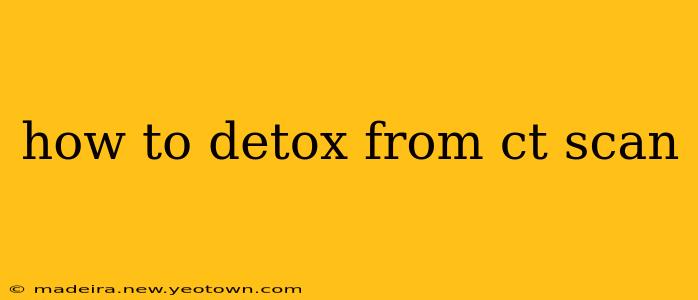How to Detox from a CT Scan: Separating Fact from Fiction
The internet is awash with information, some accurate and some… less so. When it comes to medical procedures like CT scans, anxieties can lead people to search for ways to "detox" from the radiation exposure. Let's explore the facts and separate the myths surrounding CT scan radiation and its effects.
The Reality of CT Scan Radiation:
A CT scan, or computed tomography scan, uses X-rays to create detailed cross-sectional images of the body. While this technology is invaluable for diagnosis, the ionizing radiation used does pose a small risk of long-term health effects. The amount of radiation exposure varies depending on the specific scan, the area of the body scanned, and the technology used. It's crucial to remember that a CT scan's benefits usually outweigh the risks, especially in emergency situations or when diagnosing serious conditions. Your doctor will weigh these factors when ordering the scan.
What You Can't Do (and Why):
The idea of "detoxing" from a CT scan implies that you can actively remove the radiation from your body. This is fundamentally incorrect. Your body doesn't store radiation in the same way it stores toxins. Once the scan is complete, the radiation is gone. There are no special diets, supplements, or procedures that can reverse or significantly reduce the radiation exposure from a CT scan. Claims suggesting otherwise are misleading and potentially harmful.
H2: What Can You Do After a CT Scan?
While you can't remove the radiation, you can focus on your overall health and well-being:
H3: Are there any long-term effects from CT scan radiation?
Yes, there's a small increased risk of cancer from the radiation exposure of a CT scan. However, this risk is generally low, especially when compared to the benefits of accurate diagnosis and treatment planning. The risk is significantly higher with multiple CT scans over a lifetime. Your doctor will consider this risk when deciding whether to order a CT scan.
H3: What are the risks of CT scans?
Beyond the radiation risk, potential side effects of CT scans can include:
- Allergic reactions to the contrast dye (iodine-based) sometimes used in CT scans.
- Kidney problems in individuals with pre-existing kidney disease (contrast dye can affect kidney function).
- Claustrophobia for some patients during the scan.
It's essential to discuss any health concerns or allergies with your doctor before your CT scan.
H3: How much radiation does a CT scan use compared to other imaging tests?
The radiation dose from a CT scan varies depending on the area of the body scanned and the specific protocol used. Generally, it's higher than X-rays but lower than other imaging techniques like PET scans. Your radiologist will provide information about the specific radiation dose for your scan.
H3: Is there anything I can do to reduce my radiation exposure from a CT scan?
While you can't directly eliminate the radiation received during a CT scan, your doctor will always use the lowest effective dose of radiation possible to obtain the necessary images. Discuss any concerns about radiation exposure with your physician before your scan.
Focus on Your Overall Health:
Instead of focusing on unproven "detox" methods, prioritize a healthy lifestyle after your CT scan:
- Maintain a balanced diet: This supports overall health and immune function.
- Get regular exercise: This contributes to overall well-being.
- Manage stress: Stress management techniques can benefit your mental and physical health.
The Bottom Line:
There's no way to detox from a CT scan. The radiation exposure is minimal and the benefits usually outweigh the risks. Focus on a healthy lifestyle and consult your doctor if you have any questions or concerns. Remember, reliable information comes from your healthcare professionals, not from unverified sources online.

